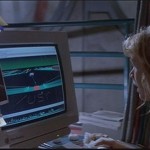I can never pass up a good Apollo documentary. I should probably credit the 1995 Apollo 13 blockbuster for sparking my interest in the Apollo program, so it’s perhaps no surprise that Ron Howard’s 2007 documentary In the Shadow of the Moon was so appealing.
The standard route through an Apollo documentary begins with Kennedy’s “We choose to go to the moon and do the other things” speech, mourns the Apollo 1 tragedy, shows pictures of Earth from Apollo 8 and video of the moon from Apollo 11, and if there’s time applauds mission control in the context of Apollo 13.
The hour and 39 minute documentary In the Shadow of the Moon takes the same basic trip, but refreshingly from the personal perspectives of the astronauts themselves. With extensive interviews with the astronauts (and none with mission controllers that I noticed), we get an entirely first-hand telling of the events as they happened up on the moon and en route.
Alan Bean of Apollo 12 describes, for example, the strange feeling of stepping out of the Lunar Module onto a deserted world:
When you land on the Moon, and you stop, and you get out, nobody’s out there. This little LM, and then two of you, you’re it. On this whole big place.
What sold me entirely, though, was the Apollo 11 landing sequence. Everyone’s heard the radio exchanges and watched video of barren lunar surface streaming past a Lunar Module window — and I’ve listened to those tapes a dozen times now. People worldwide can recognize the exchange first spoken when the lander touched down: “The Eagle has Landed.” “Roger, Tranquility. We copy you on the ground. You got a bunch of guys about to turn blue; we’re breathing again.” Charlie Duke, acting as CAPCOM, can barely get the words out.
In the Shadow of the Moon plays the same tape, but shows the video feed from inside mission control — video I never knew existed before. There, when Charlie Duke replies, “Roger Tranquility,” are the very real bunch of guys about to turn blue, some clearly about to burst with excitement.
It took a lot to surprise me with what looked like a routine Apollo history flick, but this absolutely did the trick.


